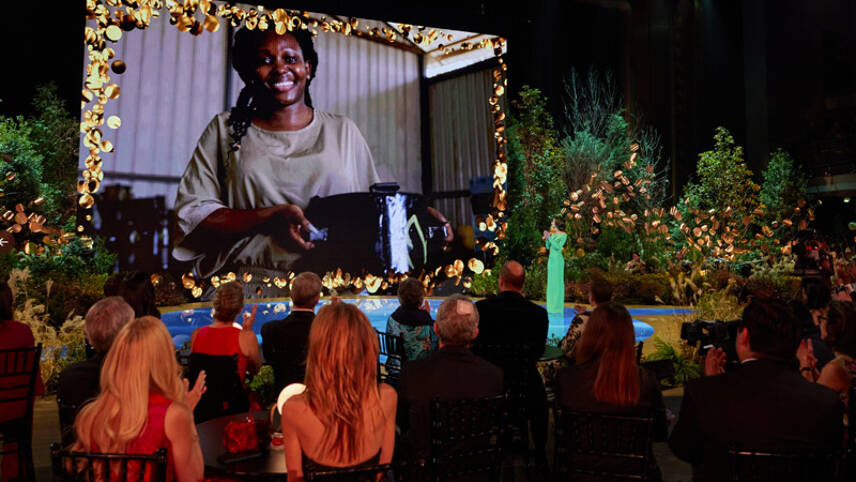Register for free and continue reading
Join our growing army of changemakers and get unlimited access to our premium content

Pictured: Kate Middleton presenting Mukuru Clean Stoves with their award. Image: Earthshot Prize
After the finalists for the 2022 Prize were unveiled last month, the awards were handed out at a glittering ceremony over the weekend, with attendees including former UN climate chief Christiana Figueres and pop stars Billie Eilish, Ellie Goulding and Chloe x Halle, as well as the royal couple.
Officially launched in October 2020, the Earthshot Prize was set up by the royals to funnel £50m into climate and nature solutions through to 2050. The idea is that, each year, five innovators – each working on a different major global environmental issue – will each receive £1m in grant funding.
The issues covered by the Prize are improving air quality; protecting and restoring nature; restoring oceans; addressing climate change and building a waste-free world.
In this latter category, British startup Notpla took the top prize. The firm has developed plastic-free, biodegradable packaging made using seaweed, including edible sachets that act as alternatives to containers for things like condiments. Notpla’s solutions have previously been supported by some big players in the private sector, including Lucozade, Unilever and Just Eat.
Notpla beat Indian firm Fleather, which is creating a leather alternative using waste from the flower trade, and the city of Amsterdam’s vision to create a fully circular economy by mid-century, to claim the prize.
The winners in the other categories are:
Improving air quality: Kenyan startup Mukuru Clean Stoves, which provides homes with cleaner cooking stoves and fuels that reduce indoor air pollution and improve safety. The World Health Organisation (WHO) estimates that 2.4 billion people globally lack clean cooking access.
Protecting and restoring nature: Kheyti, a project supporting smallholder farmers in India to adopt more nature-friendly, low-carbon and resilient methods. The startup provides farmers with a ‘greenhouse in a box’ and also provides training. 80% of the world’s farms cover less than two hectares and 100 million of these farms are in India.
Restoring oceans: Indigenous Women of the Great Barrier Reef, a project combining indigenous knowledge with digital solutions like drones to drive marine nature restoration in Australia. The scheme also trains women to become rangers.
Fixing the climate: Oman-based startup 44.01, which is developing a permanent approach to carbon dioxide storage in a bid to serve the growing carbon capture sector. The technology involves mineralising the CO2 so it becomes peridotite.
Each of the five winners will receive a £1m grant. All finalists will receive technical support and networking opportunities. It has now been revealed that the Prize received more than 1,000 applications this year.
Speaking as he presented the awards, the Prince of Wales said: “I believe that the Earthshot solutions you have seen this evening prove we can overcome our planet’s greatest challenges, and by supporting and scaling them we can change our future. Alongside tonight’s winners and finalists, and those to be discovered over the years to come, it’s my hope the Earthshot legacy will continue to grow, helping our communities and our planet to thrive.”


This comment has been removed by the commenter.